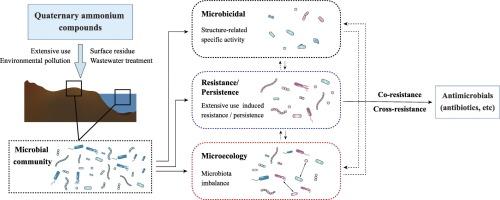当前位置:
X-MOL 学术
›
Sci. Total Environ.
›
论文详情
Our official English website, www.x-mol.net, welcomes your
feedback! (Note: you will need to create a separate account there.)
Challenges of quaternary ammonium antimicrobial agents: Mechanisms, resistance, persistence and impacts on the microecology
Science of the Total Environment ( IF 8.2 ) Pub Date : 2024-12-16 , DOI: 10.1016/j.scitotenv.2024.178020 Jiaxin Zhang, Lei Cheng, Hao Li, Xi Chen, Lin Zhang, Tiantian Shan, Jiannan Wang, Ding Chen, Jiawei Shen, Xinxuan Zhou, Lichen Gou, Lixin Zhang, Xuedong Zhou, Biao Ren
Science of the Total Environment ( IF 8.2 ) Pub Date : 2024-12-16 , DOI: 10.1016/j.scitotenv.2024.178020 Jiaxin Zhang, Lei Cheng, Hao Li, Xi Chen, Lin Zhang, Tiantian Shan, Jiannan Wang, Ding Chen, Jiawei Shen, Xinxuan Zhou, Lichen Gou, Lixin Zhang, Xuedong Zhou, Biao Ren

|
Quaternary ammonium compounds (QACs) served as broad spectrum antimicrobial agents are widely applied for surface disinfection, skin and mucous disinfection, and mouthwash. The daily applications of QACs have significantly increased, especially during the COVID-19 pandemic. However, the environmental residues of QACs have demonstrated harmful impacts on the environment, leading to an increase in environmental contamination, resistant microbes and disruption of microecology. The actions of QACs were related to their cationic character, which can impact the negatively charged cell membranes, but the details are still unclear. Moreover, bacteria with lower sensitivity and resistant pathogens have been detected in clinics and environments, while QACs were also reported to induce the formation of bacterial persisters. Even worse, the resistant bacteria even showed co-resistance and cross-resistance with traditional antibiotics, decreasing therapeutic effectiveness, and disrupting the microecology homeostasis. Unfortunately, the resistance and persistence mechanisms of QACs and the effects of QACs on microecology are still not clear, which even neglected during their daily usages. Therefore, we summarized and discussed current understandings on the antimicrobial actions, resistance, persistence and impacts on the microecology to highlight the challenges in the QACs applications and discuss the possible strategies for overcoming their drawbacks.
中文翻译:

季铵盐抗菌剂的挑战:机制、耐药性、持久性和对微生态的影响
季铵化合物 (QAC) 作为广谱抗菌剂,广泛用于表面消毒、皮肤和粘液消毒以及漱口水。QAC 的日常应用显着增加,尤其是在 COVID-19 大流行期间。然而,质量保证中心的环境残留物已显示出对环境的有害影响,导致环境污染、耐药微生物和微生态破坏的增加。QAC 的作用与其阳离子特性有关,阳离子特性会影响带负电荷的细胞膜,但细节尚不清楚。此外,已在诊所和环境中检测到敏感性较低的细菌和耐药病原体,而 QAC 也被报道会诱导细菌持久性的形成。更糟糕的是,耐药菌甚至表现出与传统抗生素的共耐药和交叉耐药性,降低了治疗效果,破坏了微生态稳态。遗憾的是,QACs 的抗性和持久性机制以及 QACs 对微生态的影响尚不清楚,甚至在其日常使用中被忽视。因此,我们总结并讨论了当前对抗菌作用、耐药性、持久性和对微生态学影响的理解,以突出 QAC 应用中的挑战并讨论克服其缺点的可能策略。
更新日期:2024-12-16
中文翻译:

季铵盐抗菌剂的挑战:机制、耐药性、持久性和对微生态的影响
季铵化合物 (QAC) 作为广谱抗菌剂,广泛用于表面消毒、皮肤和粘液消毒以及漱口水。QAC 的日常应用显着增加,尤其是在 COVID-19 大流行期间。然而,质量保证中心的环境残留物已显示出对环境的有害影响,导致环境污染、耐药微生物和微生态破坏的增加。QAC 的作用与其阳离子特性有关,阳离子特性会影响带负电荷的细胞膜,但细节尚不清楚。此外,已在诊所和环境中检测到敏感性较低的细菌和耐药病原体,而 QAC 也被报道会诱导细菌持久性的形成。更糟糕的是,耐药菌甚至表现出与传统抗生素的共耐药和交叉耐药性,降低了治疗效果,破坏了微生态稳态。遗憾的是,QACs 的抗性和持久性机制以及 QACs 对微生态的影响尚不清楚,甚至在其日常使用中被忽视。因此,我们总结并讨论了当前对抗菌作用、耐药性、持久性和对微生态学影响的理解,以突出 QAC 应用中的挑战并讨论克服其缺点的可能策略。































 京公网安备 11010802027423号
京公网安备 11010802027423号